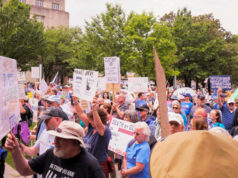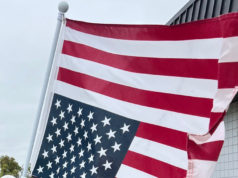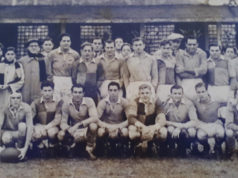This month, the Vivian Castleberry Peace Institute, formed about a year ago, was officially affiliated with the College of Arts and Sciences at the University of North Texas, which already has the only peace studies program at a four-year university in the Southwest. UNT and institute leaders predict that the affiliation will establish UNT as a key player in peace research and training, providing a venue to bring together conflict negotiators and peacemakers from around the world.
 The move is the result of decades of work by Peacemakers Inc., a Dallas-based nonprofit group that has hosted three international peace conferences for women leaders in the last two decades. The institute is named for journalist Vivian Castleberry, who spent almost three decades as a pioneering editor at the Dallas Times Herald, breaking new ground in coverage of women’s issues and mentoring generations of women journalists. After retiring in 1984, Castleberry turned her energies to the cause of peace and founded Peacemakers in 1986. “When people put as much time into making peace as they have into making war, the world will change,” she told Fort Worth Weekly.
The move is the result of decades of work by Peacemakers Inc., a Dallas-based nonprofit group that has hosted three international peace conferences for women leaders in the last two decades. The institute is named for journalist Vivian Castleberry, who spent almost three decades as a pioneering editor at the Dallas Times Herald, breaking new ground in coverage of women’s issues and mentoring generations of women journalists. After retiring in 1984, Castleberry turned her energies to the cause of peace and founded Peacemakers in 1986. “When people put as much time into making peace as they have into making war, the world will change,” she told Fort Worth Weekly.
The partnership is also a dream realized for UNT political science professor David Mason. He and other faculty members proposed creation of an institute for peace, democracy, and human rights in 2002 but made little headway until they teamed up with Peacemakers.
“Peacemakers needed an institutional home for their newly established Vivian Castleberry Peace Institute, so there was a natural convergence of interests,” he said.
Mason’s commitment to finding alternatives to war also goes back decades. Growing up in the civil rights era and attending college during the Vietnam War, he developed an interest in studying what motivates people to go to war or to oppose war, he said.
State Rep. Lon Burnam of Fort Worth, director of the Dallas Peace Center, said the Castleberry Institute is badly needed. “It’s long overdue that our academic communities institutionalize systematic peacemaking,” he said.
Founding director Carol Donovan of Dallas explained that the institute’s creation was a direct result of Peacemakers’ most recent international conference, held in 2007. Women activists and leaders from around the world developed strategies in nine areas to tackle the challenges of promoting peace – and each of the lists highlighted education as a key need. The idea of the institute developed from there, and Peacemakers began searching for a university with which to affiliate. It didn’t take Donovan long to realize that Mason and UNT were working in the same area.
Donovan said the partnership ensures that research done at the Castleberry Institute will get wide distribution. Studies will be “action and research oriented,” she said, and curriculum will include the teaching of conflict resolution skills and tolerance. The institute will also create an online worldwide directory of peacemakers and provide peace research resources.
“What the Vivian Castleberry Peace Institute will do is support faculty and graduate students doing work in the general area of peace and conflict research,” Mason said. “By virtue of being able to support them, UNT will be able to retain those faculty, attract new scholars in the field, attract top graduate students in the area, and produce more research [and] better research.”
Goals include developing a separate major in peace studies, strengthening graduate programs in peace studies, funding fellowships, creating undergraduate scholarships, and building an endowment to attract more students to the program, he said.
The institute will also enhance UNT’s ability to attract programs such as the annual meeting of Peace Science Study International, which it will host next year, and help the school compete for grants.
The Castleberry Institute could influence world politics through its research, he said, “on questions such as what conditions predict where and when wars will occur, what predicts the outcome of wars, and what predicts the durability of peace after war.
“We also have people doing research on how wars end and how to build a more sustainable peace,” Mason said. “This research has clear policy implications for cases like Iraq, Afghanistan, and other conflicts. There are some pretty robust findings on these questions; we just need to figure out a way to get policymakers to pay attention to them.”
Castleberry’s attraction to peace studies intensified after she left the security of her journalistic success. She had made trips to Russia as a citizen diplomat in the midst of the Cold War, which convinced her she needed to help “make a more harmonious world,” she said. With the help of an anthropology professor at the University of Moscow, Castleberry decided that promoting peace would require involving women from around the world.
That sparked her goal of creating a women’s peace conference. After 18 months of intense planning, about 2,000 women delegates from 57 countries arrived in Dallas in August 1988 to figure out how women could advance the cause of a more peaceful world.
“It was time for women to take responsibility in the public domain,” Castleberry said. “I learned through experience [covering the news] that when a woman is present making decisions, the results are different – more humane and more caring.” Her experience in the newspaper office and outside it “led me to absolute conviction that women can make a difference.”
In her 28 years at the Dallas Times Herald, she won numerous journalism awards and in 1984 was inducted into the Texas Women’s Hall of Fame. She has written four books and inspired many young women to follow in her footsteps.
Donovan’s passion for peacemaking dates back to watching her mother resolve disagreements in her job as a mediator with Camp Fire Inc. At the University of Texas at Austin, Donovan was the first woman elected as student body president.
Peacemaker Inc.’s commitment to peace and feminism drew Donovan to that group. She began volunteering in 2005 and ended up chairing the 2007 conference.
In Mason’s case, exposure to the civil rights and anti-war movements led him to question the interworkings of protests, justice systems, and war. He spent years researching a core question: “What could make a regular person undertake the dangerous and risky venture of joining an armed rebellion?”
That research evolved into his book, Caught in the Crossfire, which also addressed the intricate problems of finding the ingredients for lasting peace. “Once a war ends, what explains whether the peace will last or, alternatively, the nation will experience a relapse into armed conflict?” he said. “To me, that’s the big question today.”











